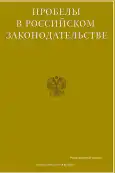Judicial Interpretation of Constitutional Norms: Content and Features
- Authors: Belova M.A.1, Volkova E.I.1
-
Affiliations:
- State University of Justice (RSUJ)
- Issue: Vol 16, No 5 (2023)
- Pages: 296-302
- Section: Public Law (State Law) Sciences
- URL: https://journal-vniispk.ru/2072-3164/article/view/250060
- EDN: https://elibrary.ru/VGLCTV
- ID: 250060
Cite item
Abstract
The purpose of the research. The article is devoted to the consideration of theoretical and practical issues of interpretation of the Constitution as a constituent act having the highest legal force, a comparison of scientific approaches to the interpretation of constitutional norms in Germany and the Russian Federation is made, the importance of the institute of interpretation in the mechanism of legal protection of the Constitution, the role of the supreme judicial bodies of constitutional control, procedural features of interpretation as one of their activities.. Results. As a result of the conducted research, the authors come to the conclusion that the interpretation of constitutional provisions by the supreme body of judicial constitutional control in the state quite reasonably acts as a way of legal protection of its main normative act of a constituent nature, the features of which are manifested in the filling of the Constitutional norms by the Court with new content without changing the text itself, thereby ensuring its stability and reliability, as well as the stability of the constitutional regulation of legal relations.
Full Text
##article.viewOnOriginalSite##About the authors
Marina A. Belova
State University of Justice (RSUJ)
Author for correspondence.
Email: marina23021980@yandex.ru
Scopus Author ID: 1010684
Cand.Sci.(Law), senior lecturer of Department of constitutional law named after N.V. Vitrukn
Russian Federation, MoscowElena I. Volkova
State University of Justice (RSUJ)
Email: gubanle@yandex.ru
Scopus Author ID: 1033364
Cand.Sci.(Law), associate professor of Department of constitutional law named after N.V. Vitrukn
Russian Federation, MoscowReferences
- Belova M.A. Correlation of concepts of tokovanie and judicial development of law in the modern German legal doctrine // Justice. 2022. Volume 4. No. 4. pp. 109-126.
- Bondar N.S. The Constitutional Court of Russia – the guarantor of the constitutional security of the individual, society, state // Constitutional justice: Bulletin of the Conference of Constitutional Control Bodies of the Countries of Young Democracy. 2003. No. 4 (22).
- Vitruk N.V. Fidelity to the Constitution – the basis of progressive development of modern Russia // Scientific Bulletin of Belgorod State University. Series: Philosophy. Sociology. Right. 2008. № 4.
- Zorkin V.D. Russia and the Constitution in the XXI century. A look from Ilyinka. M.: Norma, 2007.
- Krasnov M.A. Interpretations of the Constitution as its actual amendments // Comparative Constitutional Review. 2016. № 1.
- Luchin V.O., Mazurov A.V. Interpretation of the Constitution of the Russian Federation (review of the practice of the Constitutional Court of the Russian Federation) // Law and Power. 2001. № 1.
- Mikov I.A. Interpretation of constitutional norms // Legality and law and order in modern society. 2011. № 4.
- Ryakhovskaya T.I. Interpretation as a way to ensure the direct effect of the Constitution of the Russian Federation // Bulletin of Tomsk State University. – Tomsk: TSU, 2008. № 313.
- Khabrieva T.Ya. Reforming the Constitution of the Russian Federation: opportunities and necessity // Journal of Russian Law. 2003 № 11.
- Chervonyuk V.I., Saudakhanov M.V. Interpretation of the Constitution and constitutional hermeneutics // International Journal of Constitutional and State Law. 2018. № 4.
- Fadeev W.I.; Schulze C. Verfassungsgerichtsbarkeit in der Russischen Föderation und in der Bundesrepublik Deutschland. Rundtischgespräch an der Moskauer Staatlichen Juristischen Kutafin-Universität am 9. und 10. Oktober 2012. Potsdam: Universitätsverlag Potsdam, 2013. 152 p.
- Lepsius O. Die politische Funktion des Bundesverfassungsgerichts // Aus Politik und Zeitgeschichte. Herrschaft des Rechts. 2021. Heft 37. Pp.13-18.
- Park Z.W. Die verfassungskonforme Auslegung als richterliche Verfassungskonkretisierung. Berlin: Humboldt-Universität zu Berlin, 2000. 261 p.
- Zippelius R. Juristische Methodenlehre. 12 Aufl. München: C.H. Beck, 2021. 98 p.
Supplementary files








